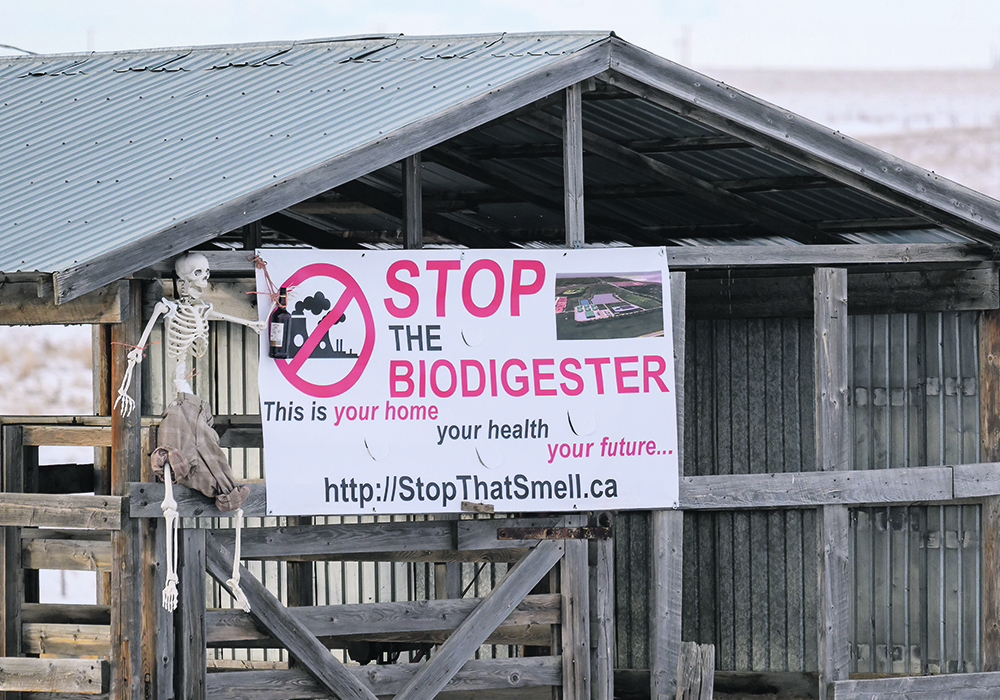Residents call for provincial moratorium amid fears project would add to feedlot odours they already experience
Residents of an Alberta community want a moratorium placed on biodigester projects in the province.
The construction of one such project has been proposed for a feedlot near High River, Alta., and residents fear it will add to the foul smells they already endure from the operation.
Related stories on this issue:
- Residents remain fearful of plans for biodigester
- Odour reduction too little
- Biodigester developer fields questions in Alta.
- Feedlot works to fix odour mystery
Read Also

Bunge’s crop mix is changing
Bunge has predominantly been a soybean processing firm, but that’s about to change after the merger with Viterra with softseed processing and grain merchandising gaining ground.
Rimrock Renewables is seeking approval for what is expected to be the largest biodigester of its kind in North America.
The $70 million project, which will be about 100 acres in size, will create renewable natural gas for about 6,000 homes, partly using manure from a nearby feedlot operated by Rimrock Feeders.
An expert speaking as part of a company presentation earlier this year said the biodigester will reduce odours from the feedlot by about 42 percent by removing manure.
However, Benita Estes, whose rural home in Foothills County will be only 200 metres from the proposed project, said the development will include an uncovered holding pond as large as 20.7 acres. Rimrock Renewables said in an email Sept. 21 that it could not discuss the biodigester while it waits for a decision about the project from Alberta Environment and Protected Areas.
Estes said she recently met with Alberta premier Danielle Smith, who is a resident of High River. Besides company officials, the meeting also included environment minister Rebecca Schulz, agriculture minister RJ Sigurdson and Livingstone-Macleod MLA Chelsae Petrovic.
“They said that they were taking it very seriously. What that means, I can only guess. I’m hoping that they really do take a good, hard look at this.”
An email that The Western Producer sent Oct. 20 to the press secretaries of Smith and Schulz requesting comment about the meeting was not returned. Estes said 546 people have signed an open letter requesting a moratorium on biodigesters in Alberta.
Such projects must be put on hold until provincial regulations are created to protect rural Albertans, she said. The smell from the feedlot, which contains about 32,000 cattle, has been so intense at times that she said she has experienced nosebleeds.
“Everybody perceives it differently,” said Estes, an acreage owner who has raised cattle in British Columbia.
As someone who has cleaned barns and been to dairy farms, she rated the smell from the feedlot as a 10 on a scale of one to 10.
“To me, it’s ammonia and it’s very pungent,” she said in an Oct. 20 interview.
“It burns your nose and it’s hard to breathe. I tried to go and sit in my hot tub last night — couldn’t do that.”
She said rural Albertans should be alarmed about the significance of Rimrock Renewables’ biodigester “because it would be scary if it actually gets built and put in this position in this spot this close to neighbours. I still can’t comprehend how they figure that being 200 metres from it is OK.”
The provincial government announced Aug. 3 that the Alberta Utilities Commission will impose a six-month moratorium on the approval of renewable energy projects greater than one megawatt. However, provincial officials have said Rimrock Renewables’ biodigester doesn’t fall under the moratorium because it will create renewable natural gas rather than electricity.
Estes said the provincial government is making a mistake by focusing only on solar and wind.
“Solar projects, although they’re ugly, they don’t smell. They don’t have traffic. I feel that these (biodigesters) in particular are more potentially dangerous for human health.”
Rimrock Renewables’ project will be about 5.5 kilometres west of High River, which has a population of nearly 15,000. Resident Julie Allen said during an interview Oct. 19 the smell from the feedlot can be so intense that it has awakened her at night in her home in the town’s northwest.
She must keep the windows open during warmer weather because she doesn’t have air conditioning.
“And what happened this weekend, and in the last probably about two or three weeks, it’s a smell of vomit, literally like human vomit, that everybody’s smelling.… it’s just horrific.”
The provincial Natural Resources Conservation Board received slightly more than 1,300 complaints during the past nine months from 277 people about the smell in High River from the feedlot, it said in an email Sept. 22. There were 285 complaints during the same period last year, it said.
Following many surprise visits this year to the town and feedlot, NRCB inspectors found that the feedlot meets the technical requirements of the Agricultural Operations Practices Act. They also found that Rimrock Feeders is operating similarly to other feedlots in southern Alberta, including those that also have pens lined with roller compacted concrete.
However, the NRCB’s goal is to reduce odours to the level they were under the feedlot’s previous owner, said compliance manager Kevin Seward.
“We won’t stop all the odours, by any means, but if we can get it down to less frequency and less offensiveness, I think that’ll be a win.”
















